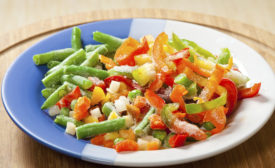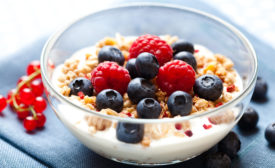Home » frozen food trends
Articles Tagged with ''frozen food trends''
‘Unconventional’ M&As change future of cold food industry
Editor-in-chief Marina Mayer recaps 2017’s jaw-dropping M&As positioned to change the cold food and beverage industry.
January 18, 2018
Acosta survey: 43% of Millennials shop frozen more frequently
26% of total U.S. grocery shoppers are shopping in the frozen foods department more frequently than last year.
October 20, 2017
Research shows increase in new product introductions in 2017
The first nine months of 2017 displayed a significant increase in new UPC codes vs. the same period in the prior year, with refrigerated yogurt experiencing a 14.5% increase.
October 16, 2017
Study: Less food wasted when using frozen produce
The study, conducted within CARVE's public-private partnership, shows that using frozen foods might reduce consumers’ food waste.
August 4, 2017
Study: Frozen fruits, vegetables help Americans achieve nutrition goals
Consumers of frozen fruits and vegetables also have significantly greater intakes of key nutrients, such as potassium, fiber and calcium.
May 2, 2017
Global IQF vegetable market poised to reach $2B by 2026
IQF potatoes, tomatoes and broccoli and cauliflower will remain in great demand.
April 10, 2017
Research highlights nutritional value of frozen fruits, vegetables
The amounts of vitamins A and C and folates of some frozen fruits and vegetables were greater than fresh-stored produce.
March 21, 2017
The frozen foods industry's journey
The journey of the frozen foods industry is nothing short of remarkable.
March 10, 2017
Elevate your expertise in refrigerated and frozen foods with unparalleled insights and connections.
Get the latest industry updates tailored your way.
JOIN TODAY!Copyright ©2024. All Rights Reserved BNP Media.
Design, CMS, Hosting & Web Development :: ePublishing






